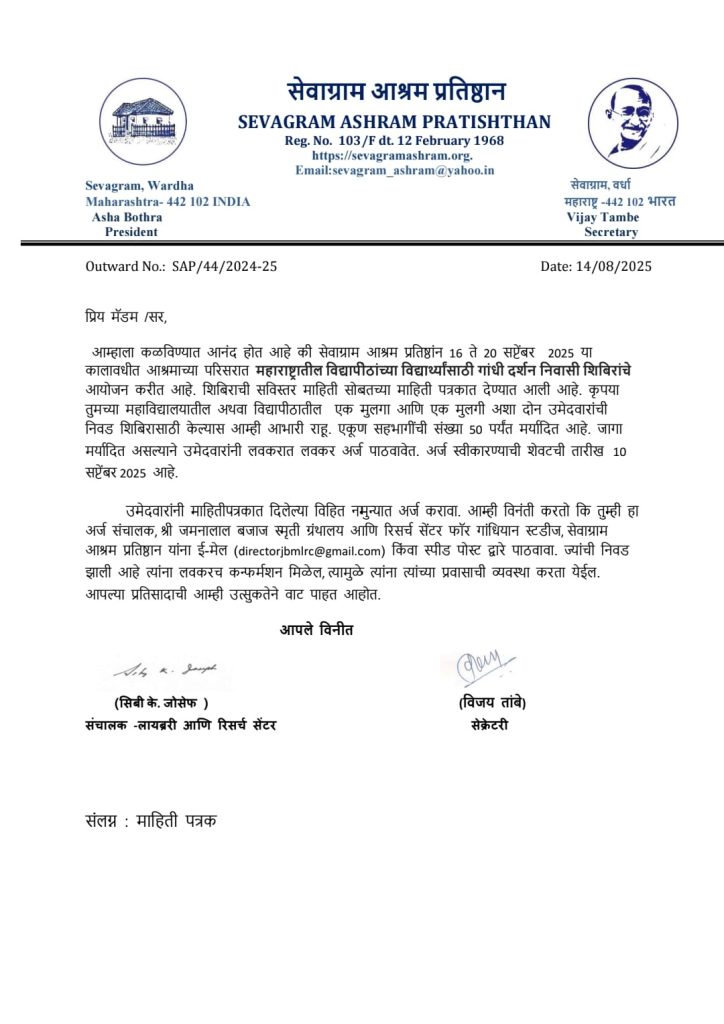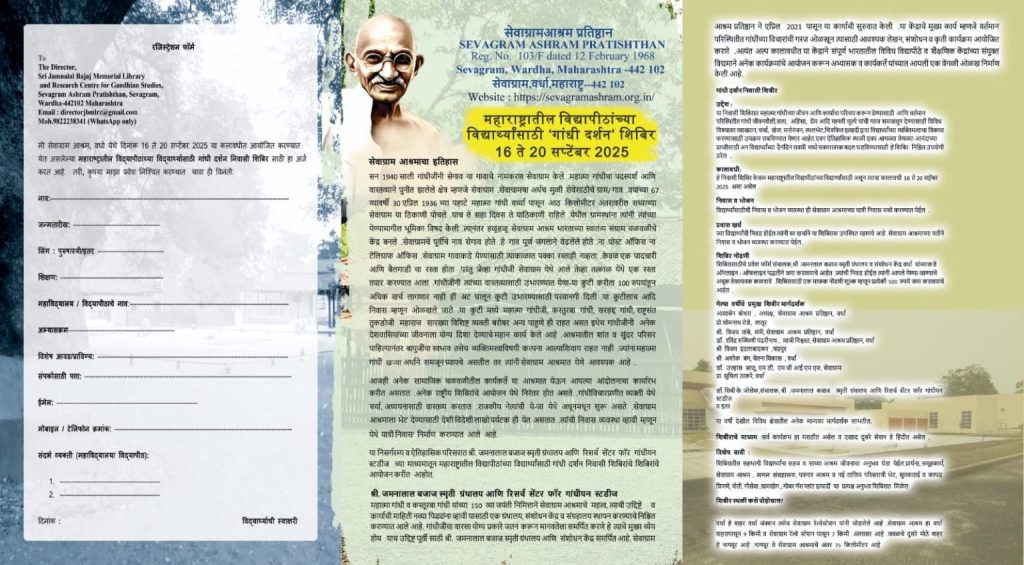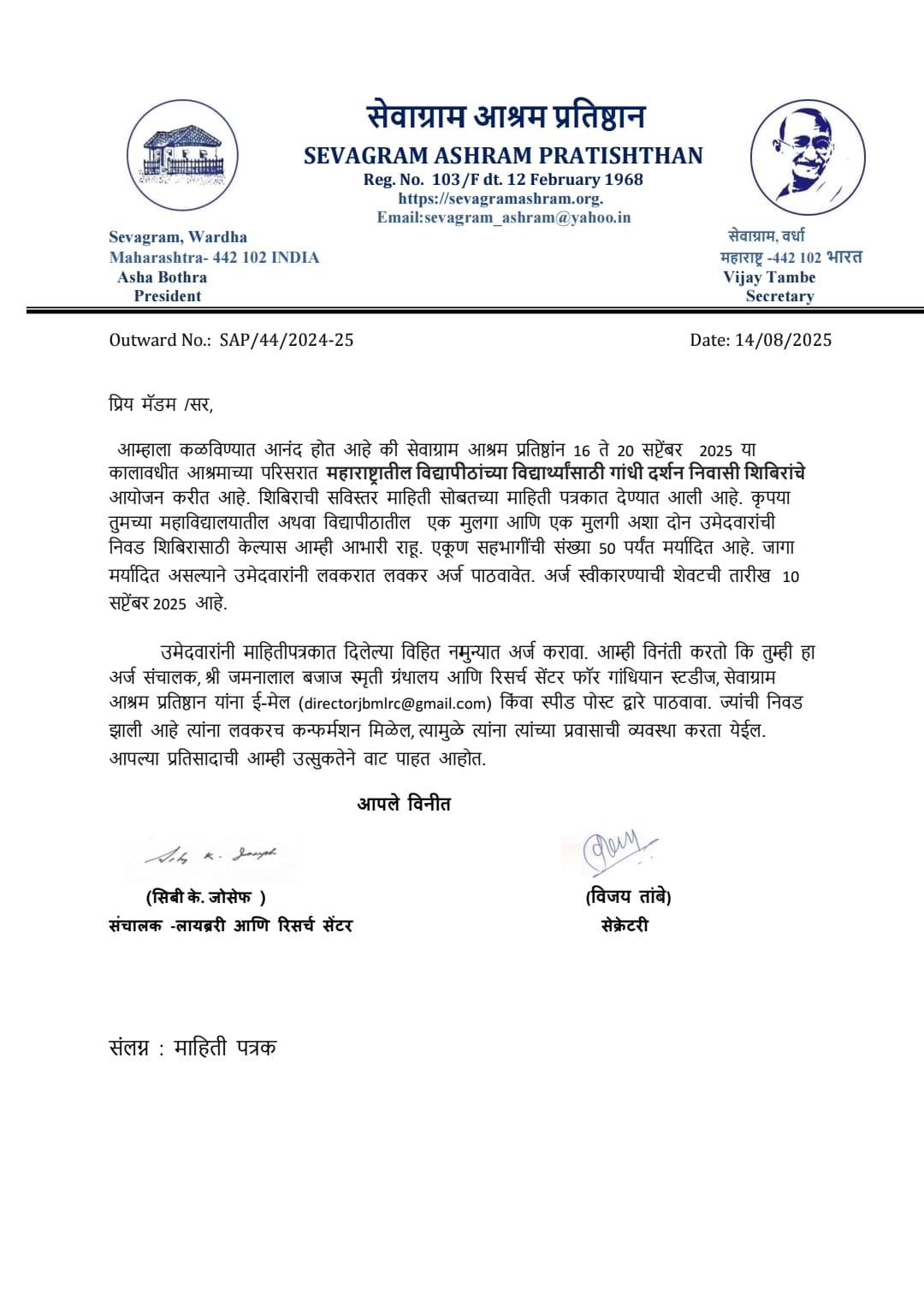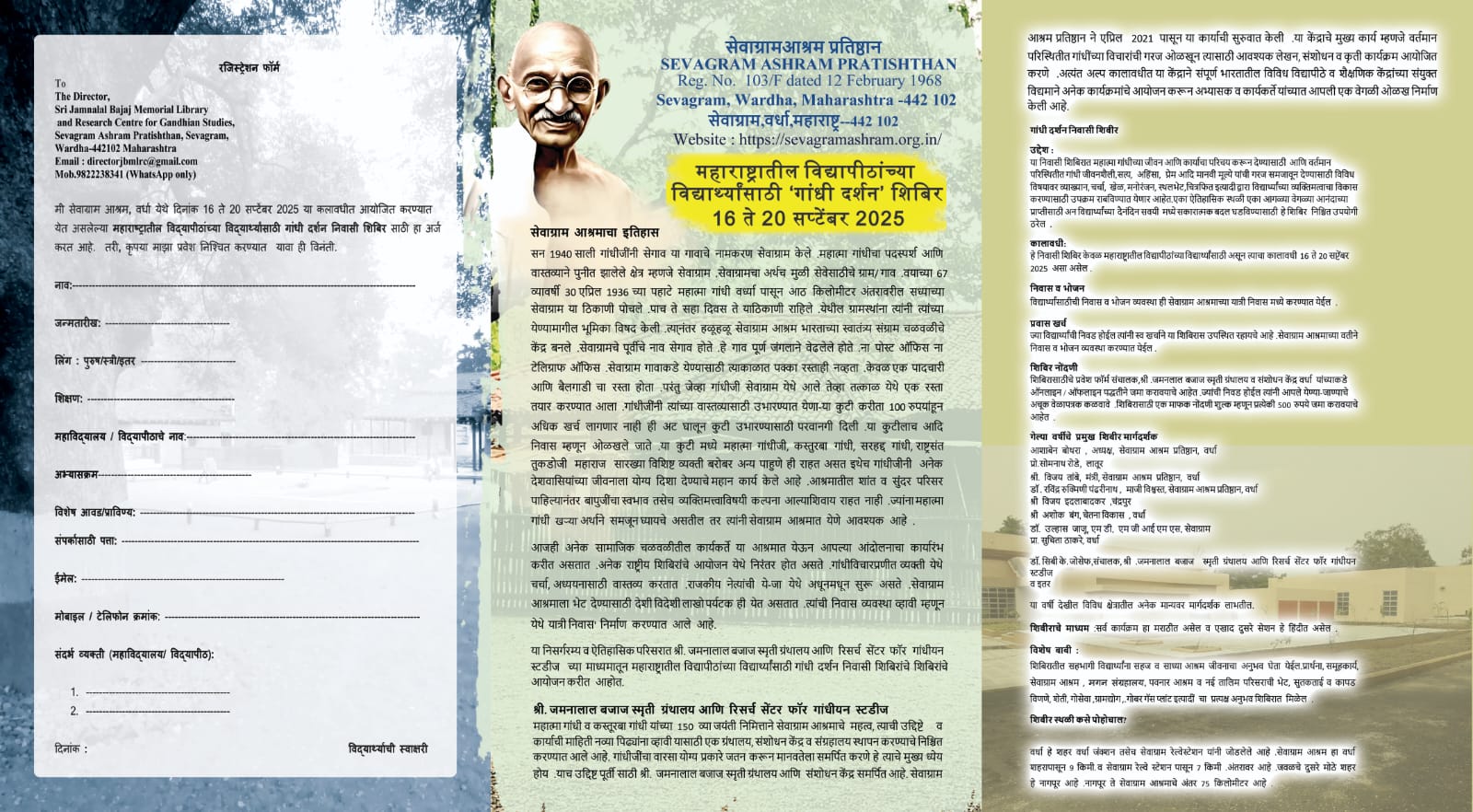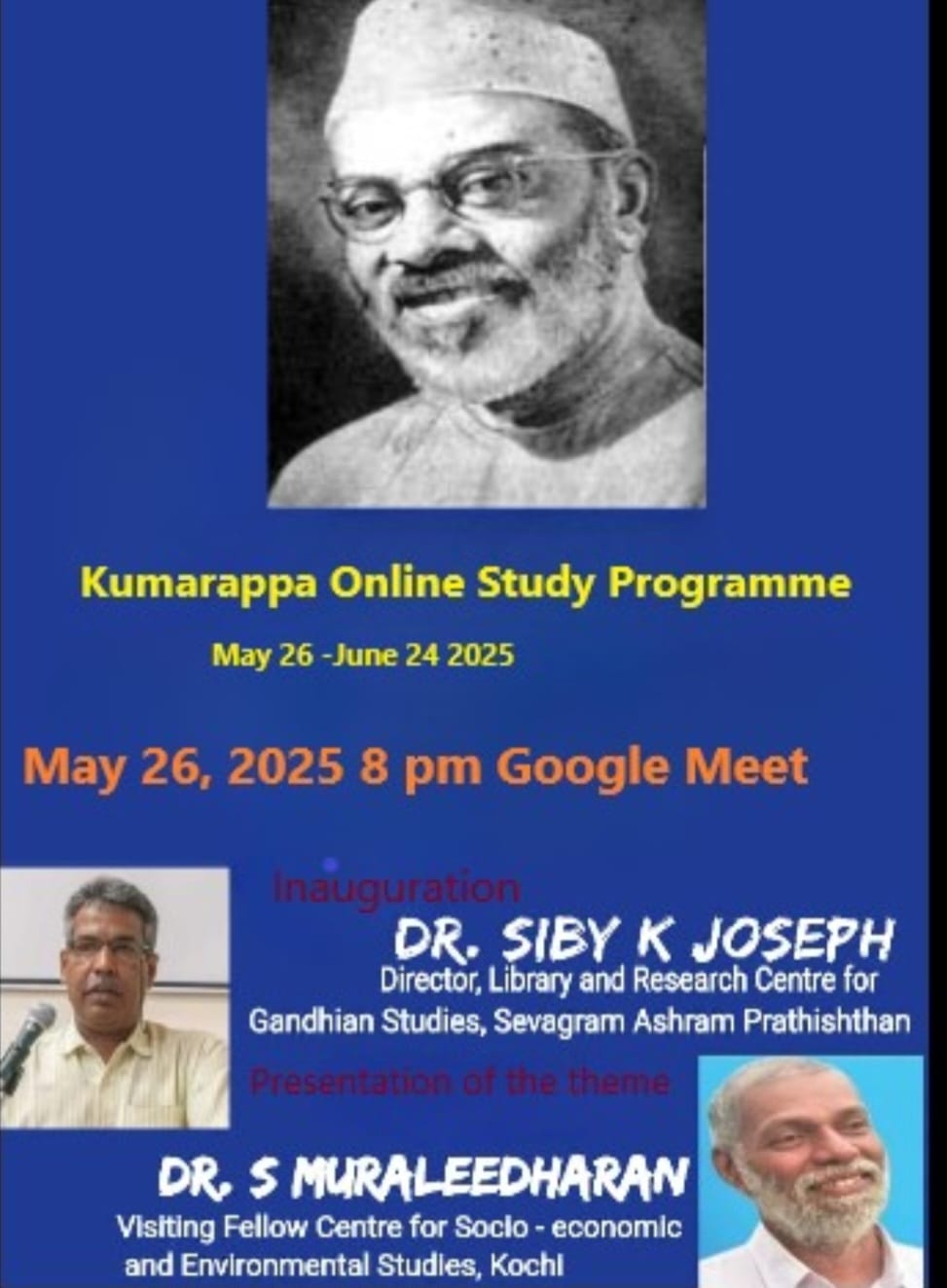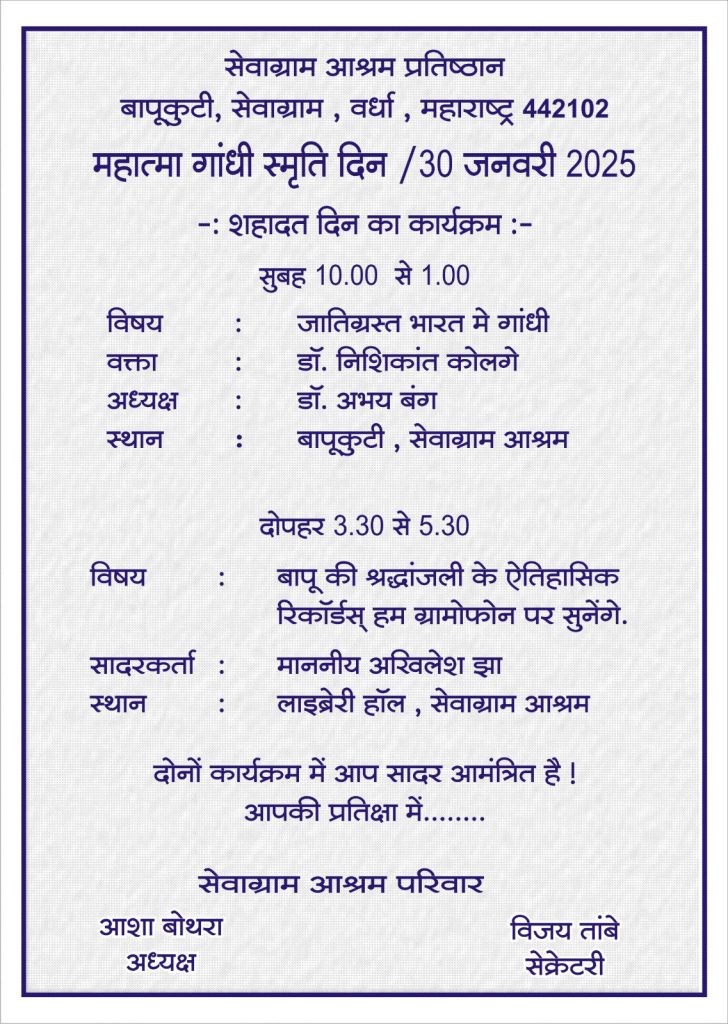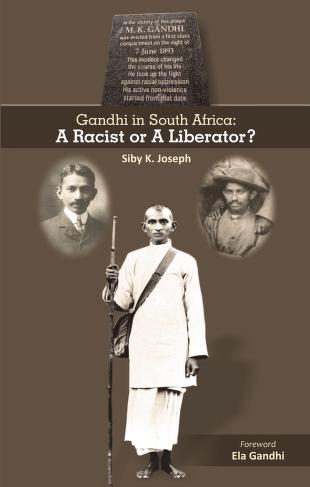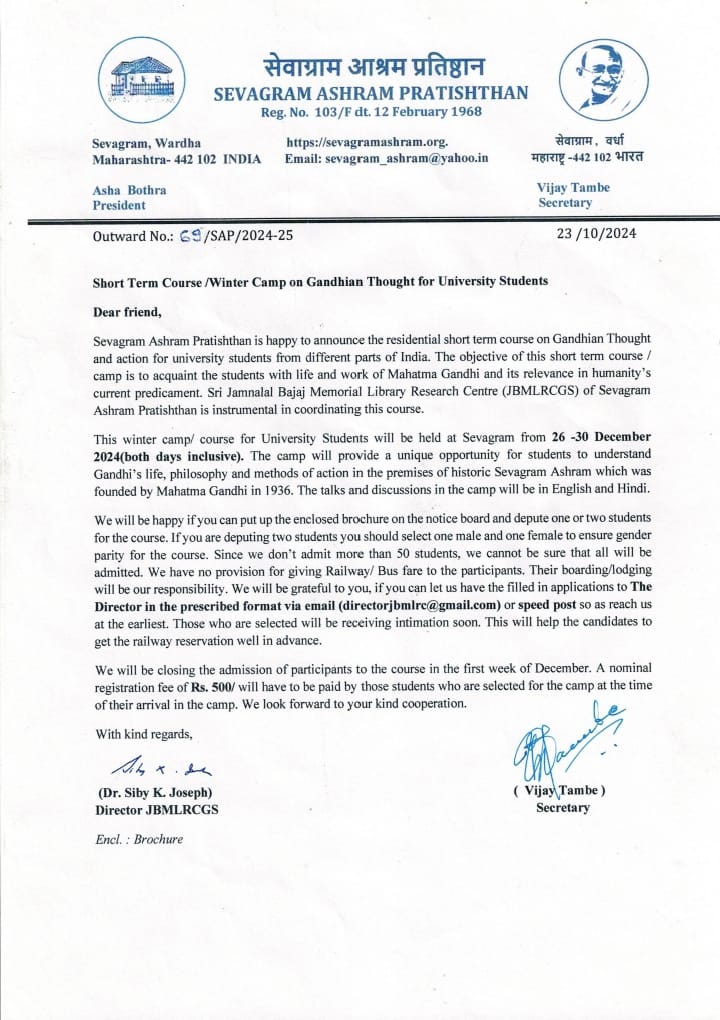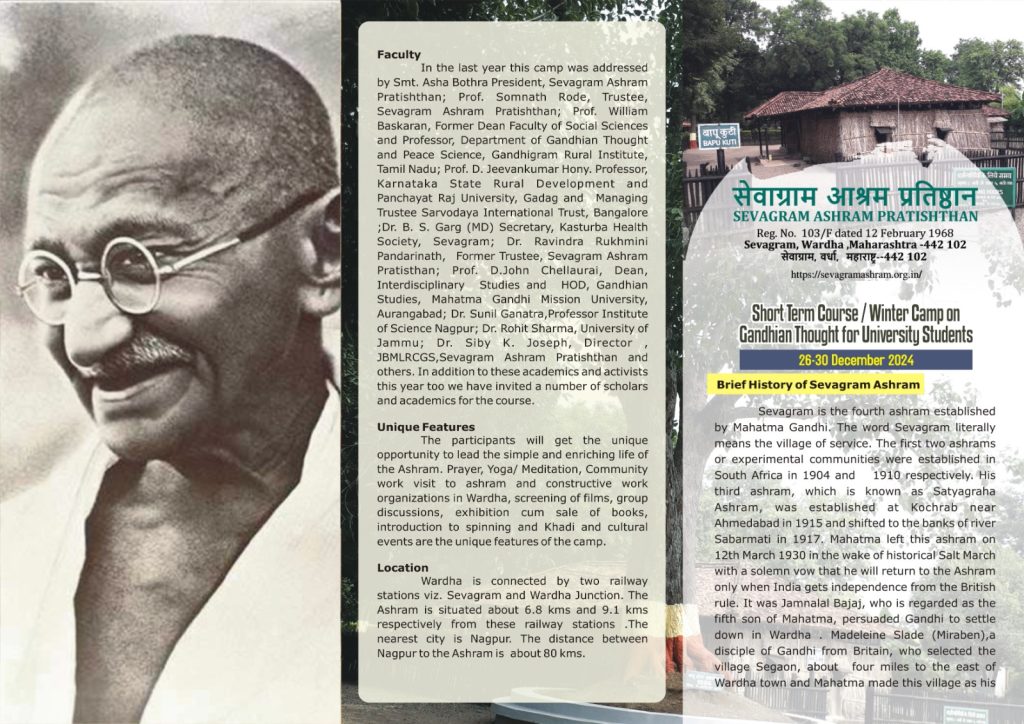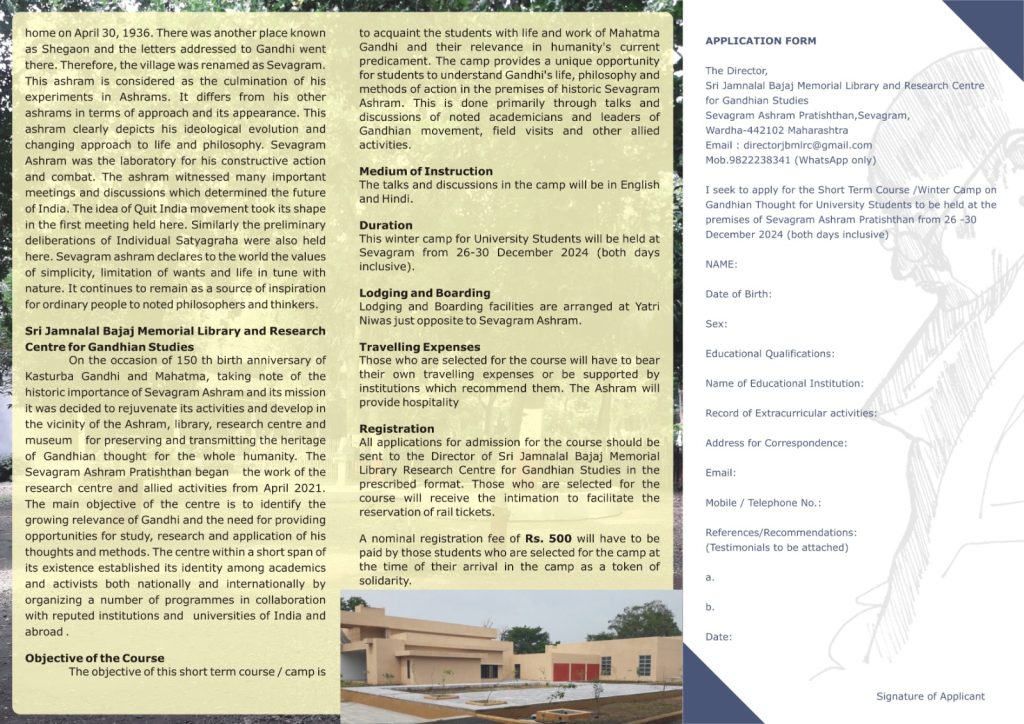Kumarappa Online Study Programme
Inauguration of Online Study Programme
Organized by Gandhian Collective and the Library and Research Centre of Sevagram Ashram Pratishthan
May 26,2025
Posted in Camps and Seminars
Leave a comment
International Fellowship
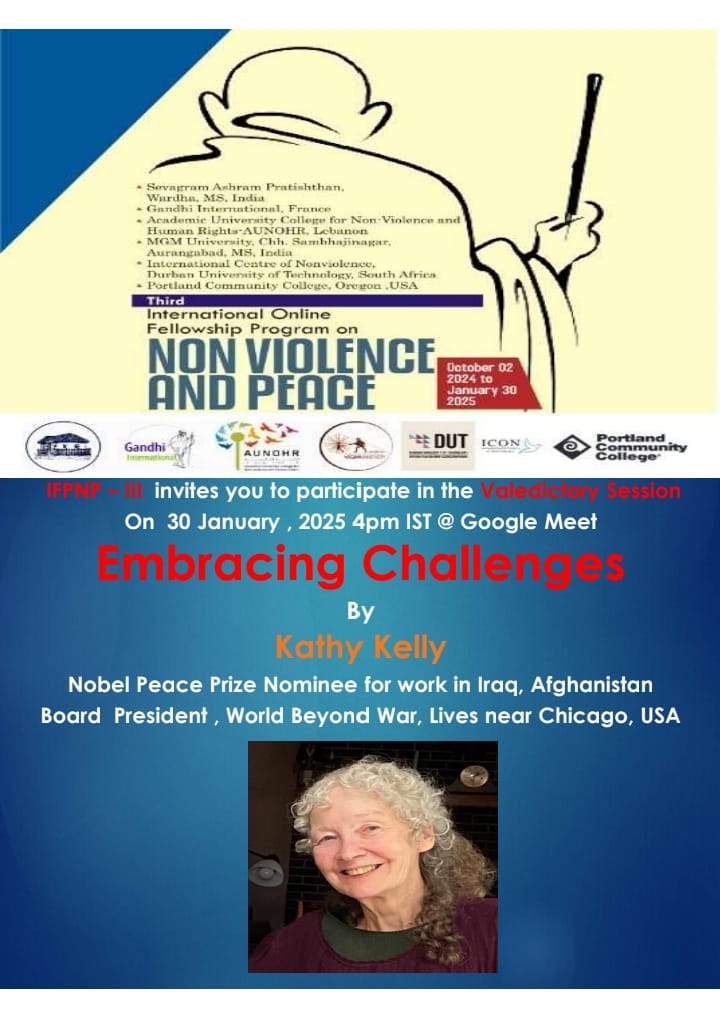
Valedictory Session of International Online Fellowship Program on Nonviolence and Peace
Embracing Challenges
By
Kathy Kelly
Nobel Peace Prize Nominee
&
Board President
World Beyond War
January 30, 2025 @Google Meet 4.00 pm IST
The valedictory Session of the International Online Fellowship Program on Nonviolence and Peace organized by Sevagram Ashram Pratishthan in association with Gandhi International,France; Academic University College for Non-Violence Lebanon;MGM University Aurangabad; International Centre for Non-violence ,Durban University of Technology, Portland Community College, Oregon will be held on January 30, 2025. The program was commenced on October 2, 2024. The Library and Research Centre of Sevagram Ashram Pratishthan was instrumental in coordinating the program.
Gandhi & King: Soul Force & Social Change
A FREE Online Course offered via the WikiNonviolence.org
During the 2025 “Season of Nonviolence”: January 30th to April 5th.
Starts: Jan 30, 2025
Offered By
Michael Sonnleitner, Ph.D.
Political Science & Peace Studies
Fulbright Scholar to India
Author: Soul Force & Social Change
ENROLL (by January 29th): Please send a short email to peacefoundation@posteo.de and we will follow up with next steps…
NOTE: A Syllabus will be provided to you and a link to attend the online sessions.
COURSE OBJECTIVES:
Provide a brief introduction to “Peace Studies”, “Nonviolence”, & a wide range of “Paths to Peace”.
Carefully examine the life, worldview, and (soul force) nonviolent action (Satyagraha) strategy of
Explore in depth the life, worldview, and (soul force) nonviolent action (Militant Nonviolence)
Promote reflection regarding the legacies of Gandhi & King both relating to their legacies and impacts on others as well as how they may help guide us in our personal lives and actions.
Mohandas K. Gandhi in effecting change in South Africa & India.
Strategy of Martin Luther King Jr. as it sought social change throughout the United States.
COURSE STRUCTURE: There will be 30 online sessions of 80 minutes each, over the ten-week period beginning with the anniversary of Gandhi’s assassination on January 30th, 1948 and the day after King’s assassination on April 4th, 1968 (known as the “Season of Nonviolence”). It is assumed that expectations of course participants will be set at the undergraduate level. Additional reading as well as a Research Paper would be expected of any participant seeking a Graduate School learning experience. Instruction in English.
COURSE TIMING: All online sessions will be held on Thursdays, Fridays, and Saturdays. So as to maximize enrolment worldwide, each 80-minute session will begin at 8:30pm (IST: Indian Standard Time). Checking on time zones relative to India, for example, this means that sessions will begin at 4pm in Germany, 3pm in The Gambia, and in the United States (with its 4 time zones) at 10am in New York, 9am in Chicago, 8am in Denver, and at 7am where the instructor resides near the Pacific Ocean in Oregon. After March 8th (due to “daylight savings time”), sessions in the U.S.A. will begin one hour later – with no changes elsewhere in the world.
The 1924 Belgaum Congress Session
The 1924 Belgaum Congress Session:A Pictorial Narrative of Mahatma Gandhi’s Presidential Debut
A Project of Library and Research Centre,
Sevagram Ashram Pratishthan, Wardha, Maharashtra
Preface
The 1924 Belgaum Congress Session holds an iconic place in India’s struggle for independence, marking the presidential debut of Mahatma Gandhi. This significant event was the 39th edition of the Indian National Congress, held in Belgaum (now Belagavi), Karnataka. Gandhi’s presidency was a defining moment, as it was the only time he presided over a Congress session.
Gandhi’s leadership transformed the Congress into a mass movement, shifting its focus from elite politics to grassroots mobilization. His presidency provided a significant boost to the Congress, bridging the divide between two factions and bringing together individuals from diverse backgrounds and faiths to work towards a common goal of Indian independence. As we commemorate the centenary of Gandhi’s presidency, we are reminded of his unwavering commitment to communal unity. This pictorial book, a project of the library and research centre of Sevagram Ashram Pratishthan, is a humble tribute to Gandhi’s legacy.
This pictorial narrative aims to introduce the younger generation to the significance of Gandhi’s presidency and the valuable lessons that can be learned from it. The narrative is presented in a clear and concise manner, making it accessible to readers who may not be familiar with the historical context. By revisiting this pivotal moment in Indian history, the publication hopes to inspire a renewed commitment to the values of unity, communal harmony, amity, and non-violence. This publication also explores the key events and decisions made during the Congress Session providing valuable insights into Gandhi’s thought process leadership style and his vision.
The idea for this publication arose from a project of research centre proposed by Basavaraj N.Akki on the significance of Gandhi’s presidential debut and an annotated edition of the 39th Indian National Congress Session. This publication is expected to resonate with readers from diverse backgrounds, sparking new interest in Gandhi’s legacy and inspiring further research, while promoting a deeper understanding of India’s freedom struggle and the enduring values that underpin it.
Siby K. Joseph
Sevagram Ashram
Acknowledgements
We are grateful to numerous individuals and organizations for their support and contributions to this project. We extend our heartfelt thanks to Ashaben Bothra, President of Sevagram Ashram Pratishthan, and Vijay Tambe, Secretary, for their unconditional support.
We are also indebted to Ushaben Thakkar, President of Mani Bhavan Gandhi Sangrahalaya, and Yogesh Kamdar, Hon. Secretary, Librarian and other staff members, for their kind support. We appreciate the assistance provided by the staff and authorities of the archives of Bombay and different districts of Karnataka.
We are thankful to Wooday P. Krishna, President of Karnataka Gandhi Smarak, and N. R. Vishukumar, Working President, for their kind help and support. Vishukumar’s efforts in checking the translated text in Kannada and ensuring the timely execution of the project are particularly appreciated.
The Sarvodaya International Trust, Bangalore, was keen in bringing this collection of invaluable photographs to light for posterity. We extend our sincere gratitude to the trust’s founder, veteran diplomat Pascal Alan Nazareth, and D. Jeevan Kumar, for their generous support and help in this project.
Rahul Shinde, CEO of ZP Belgaum, played a pivotal role in connecting the Government of Karnataka and the Belgaum district administration, and we appreciate his efforts in the publication and its dissemination among different cross sections of the society.
We express our special thanks to John S Moolakkattu, Chief Editor, Gandhi Marg, Newl Delhi , Formerly Professor of International Relations & Politics, Central University of Kerala, Director of School of Gandhian Studies at M.G. University, Professor of Development Studies at IIT Madras & Gandhi-Luthuli Professorial Chair in Peace Studies at University of KwaZulu Natal, Durban and D. Jeevan Kumar,Former Director, Centre for Gandhian Studies and Professor of Political Science Bangalore University, Hon. Professor at Karnataka State Rural Development and Panchayat Raj University, Gadag and Managing Trustee, Sarvodaya International Trust for their kind appreciation of the work.
We thank the Sevagram Ashram Community, including workers and staff members, for their support and help.
We also take this opportunity to thank our families and friends who have always been a source of inspiration and constant encouragement.
Siby K. Joseph
Basavaraj N. Akki
This illustrated account of the Belagavi session, written and compiled by Siby K. Joseph and Basavaraj N. Akki, is a very useful and timely publication in the event’s centenary year. It is often said that a picture is more valuable than a thousand words since visual information is easier for our brains to process and comprehend. This pictorial narration allows us to see how carefully the event was organized. It gives the reader important glimpses into Karnataka’s role in the national movement, and will be very valuable to the students. The authors need to be commended for undertaking this work with passion and devotion.
John S Moolakkattu, Chief Editor, Gandhi Marg, Journal of Gandhi Peace Foundation, New Delhi
The 1924 Belgaum Session of the Indian National Congress, presided over by Mahatma Gandhi, marked a pivotal moment in India’s struggle for independence. As the country navigated the complexities of colonial rule, the Belgaum Session became a crucial juncture in the quest for freedom. In this pictorial exposition, the book delves into the circumstances that led to Gandhi’s acceptance of Presidentship of the session, the organizational details of a session that required meticulous planning and execution, the key resolutions that were passed – and much more. The narrative provides a good glimpse of Gandhi’s leadership and his vision of non-violent resistance and constructive work. It also affords a deeper understanding of how Gandhi’s philosophy and strategy shaped the trajectory of India’s independence movement, setting the stage for revolutionary change in the future.
- Jeevan Kumar
Former Director, Centre for Gandhian Studies, Bangalore University, and Managing Trustee, Sarvodaya International Trust.
About the Authors
Siby K. Joseph is currently serving as Director, Sri Jamnalal Bajaj Memorial Library and Research Centre for Gandhian Studies, Sevagram Ashram Pratishthan, Wardha, Maharashtra. His Ph. D. is in Gandhian Thought and Development Studies. As an academic and researcher, he edited a number of books and published several books, monographs and articles.
Basavaraj N. Akki is an archivist and historian engaged in research studies relating to history and has number of publications to his credit. He completed UGC and ICHR Major Research Projects . His Ph. D. is in history. He served as Professor of History, Government First Grade College, Dandeli , Karnataka .
A Project of Library and Research Centre,Sevagram Ashram Pratishthan, Wardha, Maharashtra https://sevagramashram.org.in/ https://nonvpi.in
Published by
Somesvara Publications
Dharwad
To download the book click the link given below
Posted in Mahatma, Publications
Leave a comment

